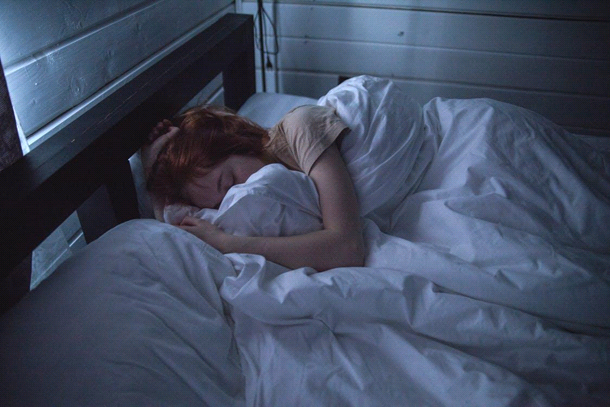The Woman’s Guide To A Better Night’s Sleep
As women, it can feel impossible to weave yet another thing into our days. While sleep is a critical factor in our lives, keeping our minds and bodies healthy, we often find ourselves lacking the necessary hours to restore ourselves.
The amount of sleep that allows us to be healthy, vibrant individuals is typically far more than we typically get. Consistent sleep deprivation and poor sleep can lead to significant health concerns for women, including decreased mental health, increased risk for heart disease and increased risk for diabetes.
While sleep can often be one of the underlying, it can feel like a major challenge to get a better night’s rest. Consider these adjustments to your current lifestyle to gain a more restful and restorative night’s sleep.
Sleep Hygiene
Sleep hygiene is an important step in snoozing, as this designates a clear schedule and environment that is conducive to sleep. This goes beyond the 7 to 9 hours of sleep that is recommended. When developing a sleep hygiene, you will need to set up the ideal conditions for sleep.
Determining relaxing practices, such as a bath or shower and reading a book may offer a respite from your day, while eliminating the stimulating parts of your day, such as using your phone or exercising. By limiting the stimulants that you interact with before going to sleep and creating a standard routine, your body will remember this sequence of events and know that it is time to power down.
While these arrangements signal to your body that it is time for bed, it is important to create a schedule and stick to it every day, or at a minimum on weekdays.
Environment
Your environment plays a huge role in your sleep hygiene and the ability to gain a restful night’s sleep. Factors like the temperature of your room, your mattress, the level of sound and your bedding can all play into the sleep equation. It is important to make sure that your room is cool and dark, little disruptive sounds make it into your bedroom and that you have a mattress that is cohesive to your sleep style and needs.
Many of these can be mitigated with adjustments such as blackout curtains, white noise machines and replacing an old, useless mattress. Setting your bedroom up so that it becomes your safe haven for sleep is a critical and influential component of this process.
Eating
Consumption of any kind before bed can trigger your body into thinking it should stay away or cause issues that can disrupt your sleep. Whether your vice is rich ice cream, a relaxing glass of wine or a fatty snack before bed, all of these can cause your body to wake up and in some cases result in acid reflux which can further disturb your sleep patterns. Consider limiting these foods or consuming these at least 2 hours before bed, as they can leave you feeling restless in the morning. Even the smallest of consumption can trigger your body to sleep fitfully.
If you are getting up in the middle of the night to go to the bathroom, you cannot complete proper REM sleep cycles and it is time to avoid drinking a lot of liquids before bed. Try consuming smaller amounts of water throughout the day and limiting your liquid consumption right before bed.
Exercise
Exercise is beneficial for everyone’s life, however, this is even more important for those who have trouble falling or staying asleep. By introducing at least 30 minutes of exercise per day, you can help your body regulate better sleep over time, positively affecting your ability to sleep.
One caveat of this is the timing of exercise. While many find themselves with more time at the end of the day, if timed too close to bedtime and you may find your heart still pumping and an inability to fall asleep. Just like you need time to cool down, your body and mind need time to relax and rest after a workout to power down for a good night’s rest.
Timing your exercise for a few hours before bedtime and you’ll be sure to reap the benefits of introducing physical activity into your routine.
Mindfulness And Meditation
After a busy and stressful day, you may find your mind racing. The ability to turn our thoughts off at bedtime can feel impossible. However, while there is not a switch to turn off our brains, we can power down through the integration of mindfulness and meditation practices into routine.
This powerful practice can allow us to sit with some of that anxiety and let it pass, bringing us back to the present moment so that we can make peace with whatever is going through our minds. While this can take practice and will require work, the benefits are endless when you dedicate the time and energy into this exercise.
App Assistance
There are plenty of apps out there these days and there are certainly those to support sleep. Whether you are interested in learning more about your sleep health, analyzing your current sleep or offering white noise, there is an app for that.
While powering down any electronic devices before bedtime is useful, particularly those that have a bright or blue light behind them, these apps can be game-changers for your sleep health.
Hormone Health
For women, sleep challenges can go beyond slowing down our minds and changing our environments. While these parts of sleep hygiene can certainly benefit our bedtimes, there are oftentimes where our bodies can play tricks on us. Hormone imbalances can trigger difficulty sleeping and mood disturbances, so it is not uncommon to consider introducing hormone balance to assist while navigating these difficulties to aid in sleep.
When To See A Doctor
Sleep can feel trivial and insignificant when it comes to health problems, however, these can trigger a great deal of other major health concerns. This means that sleep must be given the attention it demands. Whether you have sleep concerns or suspect sleep-related health conditions, it is important to consult your doctor in a timely fashion who can assist you in finding an appropriate remedy, so that minor health concerns do not turn into major ones.
Whether you are sleeping poorly or getting too few hours, it is important to know that there are answers on the horizon. You too can get a restful and restorative night’s rest. Consider how you can adjust your current practices to embrace healthier practices or if it is necessary to consult your health professional to dive a bit deeper. However you approach this, better sleep is achievable.
Call Alaska Sleep Clinic today for a free sleep assessment. We are equipped with Sleep TM, the latest in sleep technology, giving you the opportunity to have a consultation from your home while work through this Worldwide pandemic.




